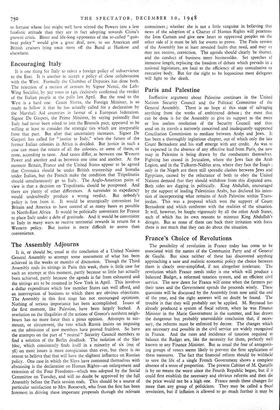Encouraging Italy
It is one thing for Italy to reject a foreign policy of subservienCe to the East. It is another to accept a policy of close collaboration with the West. Formally the Chamber of Deputies has done both. The rejection of a motion of censure by Signor Nenni, the Left- Wing Socialist, by 302 votes to 140, decisively confirmed the verdict of the Italian people at the polls last April. But the road to the West is a hard one. Count Sforza, the Foreign Minister, is so ready to follow it that he has actually called for a declaration by the Marshall Aid countries in favour of a European federation. Signor De Gasperi, the Prime Minister, by saying pointedly that Italy had never been asked to join the Brussels pact, appeared to be willing at least to consider the strategic ties which are inseparable from that pact. But after that uncertainty increases. Signor De Gasperi has called for " justice to Italy," when the future of the former Italian colonies in Africa is decided. But justice in such a case can mean the return of all the colonies, or some of them, or none, according to taste. And tastes differ, as between one Western Power and another and as between one time and another. At the moment Britain, France and the United States appear to be agreed that Cyrenaica should be under British trusteeship and Somalia under Italian, but the French make the condition that Tripolitania should simultaneously go to Italy. The Anglo-American point of view is that a decision on Tripolitania should be postponed. And there are plenty of other differences. A surrender to expediency would undoubtedly produce a wrong verdict. But nobody's policy is free from it. It would be strategically convenient for Britain and America to have control of as many bases as possible in North-East Africa. It would be politically convenient for France to place Italy under a debt of gratitude. And it would be convenient to Italy in many ways to receive territorial rewards in return for a Western policy. But justice is more difficult to assess than convenience.














































 Previous page
Previous page